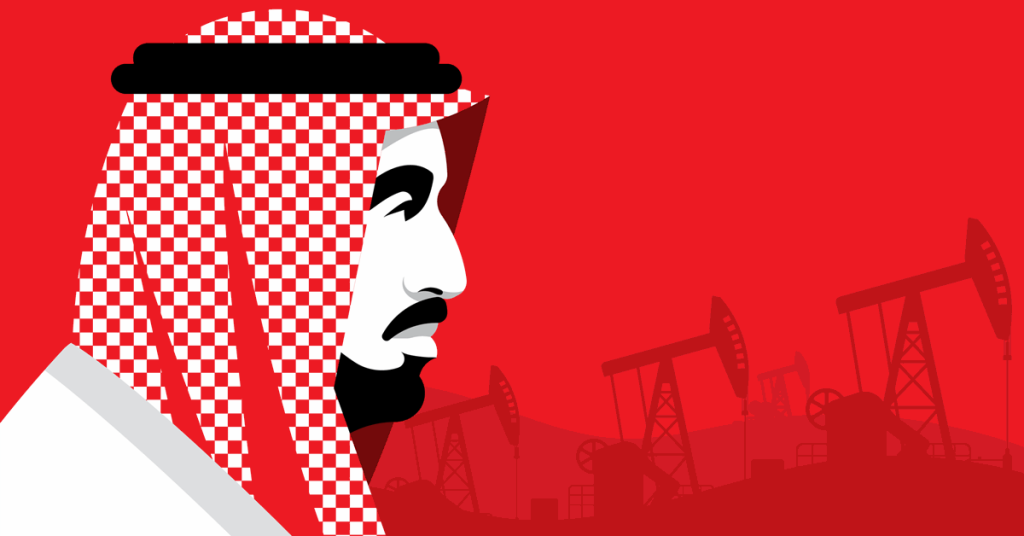Saudi Arabia led a surge in crude exports from stalwart oil-producing giants in the Middle East in June.
The flood may reflect a race by Riyadh – along with neighboring Kuwait and the United Arab Emirates – to expedite barrels out of the Persian Gulf while a conflict between Israel and Iran threatened the region’s shipping corridor. While the trio are entitled to raise crude production under an OPEC+ accord, their exports appear to have climbed even further.
The three nations loaded 11.9 million barrels a day onto tankers in June, ship-tracking compiled by Bloomberg shows. Their collective seaborne exports were the highest since April 2023.
“Amid supply disruption concerns, Middle Eastern oil producers might have looked at additional storage locations around the world,” said Giovanni Staunovo, a commodity analyst UBS Group AG.
The boost from the three producers, who rank among the biggest and most reliable in the Organization of the Petroleum Exporting Countries, signals the group and its partners are pressing on with plans to speed up the return of halted output – a strategy shift that has rattled crude traders and depressed prices, given faltering demand and an impending oversupply.
The correlation between exports and production is patchy because countries load barrels from storage and can also ship them to storage. Likewise, the timing of a few large tanker shipments can have a big impact on flow rates. The bottom line, though is that the month-on-month gain from the trio – at 937,000 a day, their largest collective hike since September 2023 – means large amounts of extra supply are now en route toward buyer countries.
Riyadh bolstered crude exports by 441,000 barrels a day, or about 7 percent, this month to 6.36 million a day, according to a preliminary analysis of tanker-tracking data compiled by Bloomberg. Kuwait’s exports rose to the highest since late 2023 while the UAE’s reached a seven-month high.
The Saudi jump comes even as the kingdom boosts domestic oil use in power generation and water desalination sectors amid soaring temperatures, which are currently topping 40C degrees in Riyadh. With the OPEC+ coalition contemplating further increases to output, Riyadh could be in a position to push out a greater proportion of supplies once the searing summer heat passes.
Crude futures have eased as the Israel-Iran conflict settles into a fragile ceasefire, slumping 12 percent in London last week to trade near $67 a barrel on Tuesday. OPEC+ will meet online this weekend to consider another output hike for August.
Eight key nations – including the Gulf trio – within the Organization of the Petroleum Exporting Countries and its partners have approved hikes of 411,000 barrels per day in May, June and July, triple the initially-scheduled volume. The agreement permits Saudi Arabia to add 167,000 barrels in each of those months.
Delegates say the group will consider another increase of the same magnitude for August when ministers convene a monthly video conference on Sunday. Saudi Energy Minister Prince Abdulaziz bin Salman has remained characteristically tight-lipped on his intentions.
Riyadh’s strategic pivot, from years of tightly restraining oil supplies to opening the taps, stunned crude traders when the move was first announced in early April. Officials have offered a range of explanations, including a desire to reclaim the market share they had ceded to rivals like US shale drillers.
What do you think? We’d love to hear from you, join the conversation on the
Rigzone Energy Network.
The Rigzone Energy Network is a new social experience created for you and all energy professionals to Speak Up about our industry, share knowledge, connect with peers and industry insiders and engage in a professional community that will empower your career in energy.
element
var scriptTag = document.createElement(‘script’);
scriptTag.src = url;
scriptTag.async = true;
scriptTag.onload = implementationCode;
scriptTag.onreadystatechange = implementationCode;
location.appendChild(scriptTag);
};
var div = document.getElementById(‘rigzonelogo’);
div.innerHTML += ” +
‘‘ +
”;
var initJobSearch = function () {
//console.log(“call back”);
}
var addMetaPixel = function () {
if (-1 > -1 || -1 > -1) {
/*Meta Pixel Code*/
!function(f,b,e,v,n,t,s)
{if(f.fbq)return;n=f.fbq=function(){n.callMethod?
n.callMethod.apply(n,arguments):n.queue.push(arguments)};
if(!f._fbq)f._fbq=n;n.push=n;n.loaded=!0;n.version=’2.0′;
n.queue=[];t=b.createElement(e);t.async=!0;
t.src=v;s=b.getElementsByTagName(e)[0];
s.parentNode.insertBefore(t,s)}(window, document,’script’,
‘https://connect.facebook.net/en_US/fbevents.js’);
fbq(‘init’, ‘1517407191885185’);
fbq(‘track’, ‘PageView’);
/*End Meta Pixel Code*/
} else if (0 > -1 && 88 > -1)
{
/*Meta Pixel Code*/
!function(f,b,e,v,n,t,s)
{if(f.fbq)return;n=f.fbq=function(){n.callMethod?
n.callMethod.apply(n,arguments):n.queue.push(arguments)};
if(!f._fbq)f._fbq=n;n.push=n;n.loaded=!0;n.version=’2.0′;
n.queue=[];t=b.createElement(e);t.async=!0;
t.src=v;s=b.getElementsByTagName(e)[0];
s.parentNode.insertBefore(t,s)}(window, document,’script’,
‘https://connect.facebook.net/en_US/fbevents.js’);
fbq(‘init’, ‘1517407191885185’);
fbq(‘track’, ‘PageView’);
/*End Meta Pixel Code*/
}
}
// function gtmFunctionForLayout()
// {
//loadJS(“https://www.googletagmanager.com/gtag/js?id=G-K6ZDLWV6VX”, initJobSearch, document.body);
//}
// window.onload = (e => {
// setTimeout(
// function () {
// document.addEventListener(“DOMContentLoaded”, function () {
// // Select all anchor elements with class ‘ui-tabs-anchor’
// const anchors = document.querySelectorAll(‘a .ui-tabs-anchor’);
// // Loop through each anchor and remove the role attribute if it is set to “presentation”
// anchors.forEach(anchor => {
// if (anchor.getAttribute(‘role’) === ‘presentation’) {
// anchor.removeAttribute(‘role’);
// }
// });
// });
// }
// , 200);
//});

